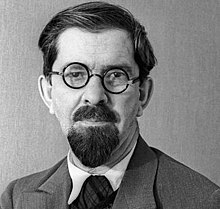Lev Vladimirovich Rudnev
| Lev Rudnev Лев Владимирович Ру́днев |
|
|---|---|
 |
|
| Born |
1 March 1885 Opochka |
| Died | 19 November 1956 (aged 71) Moscow, Russia |
| Nationality | Russian |
| Alma mater | Imperial Academy of Arts in Saint Petersburg |
| Occupation | Architect |
| Buildings | Palace of Culture and Science, The main building of Moscow State University |
Lev Vladimirovich Rudnev (Russian: Лев Владимирович Ру́днев; 13 March [O.S. 1 March] 1885 – November 19, 1956) was a Soviet architect, and a leading practitioner of Stalinist architecture.
Rudnev was born to the family of a school teacher in the town of Opochka (other sources state Novgorod). He graduated from the Riga Realschule (now the Riga 1st State Grammar School) and entered the Imperial Academy of Arts in Saint Petersburg (1906). At the Academy he studied painting under Leon Benois and architecture under Ivan Fomin. From 1911 Rudnev was a success in various architectural competitions, and in 1915 he became a certified specialist in the art of architecture.
After the February Revolution Rudnev won the competition for the Victims of the Revolution monument on the Field of Mars in Petrograd (March 1917). The avant-garde monument there was built according to his design.
After the end of the Second World War, Lev Rudnev took active part in reconstructing the ruined cities of Voronezh, Stalingrad, Riga and Moscow. In 1922–1948 Rudnev was a Professor of the Academy of Arts (former Imperial Academy of Arts) in Leningrad; in 1948–1952 he was a Professor at the Moscow Institute for Architecture (Moskovskij Arkhitekturny Institut). Rudnev was also a member of Soviet Academy of Architecture.
...
Wikipedia
